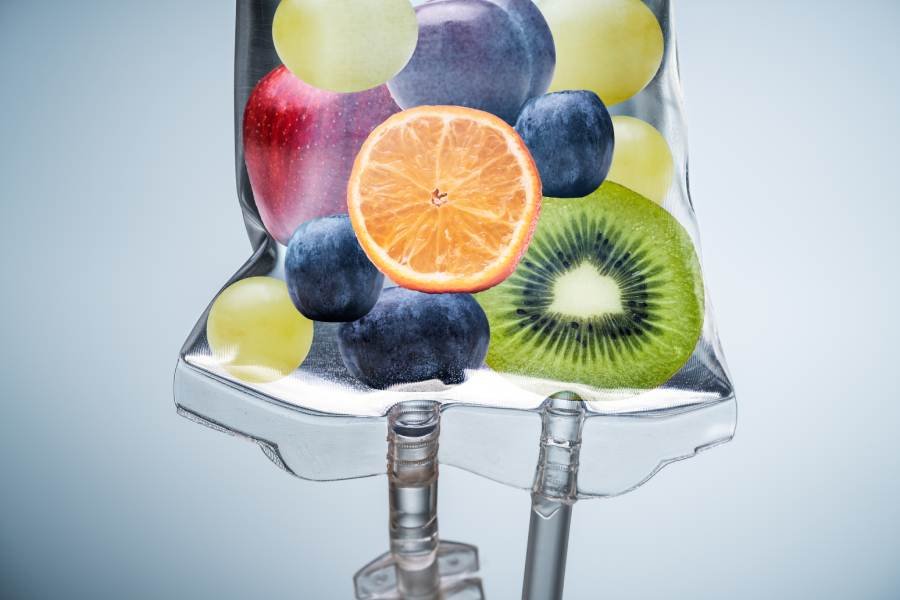IV fluids are often used to provide hydration and to deliver medications directly into the bloodstream. So you might be wondering how long do IV fluids stay in body. Knowing how long these fluids stay in your system for good healthcare management is important.
In this article, you’ll look at the length of stay of intravenous fluids in the body and the factors that may influence their timeframe.

Source: shutterstock.com / Photo Contributor: Daria Voronchuk
How Long Do IV Fluids Stay in Body
When understanding how long do IV fluids stay in body, there are a few things to keep in mind. Whether you’re getting intravenous IV therapy for a medical reason or simply to stay hydrated, it’s natural to wonder how long does IV saline stay in your body.
The duration of IV fluid retention in the body might vary depending on a few factors. Most IV fluids that are put in the body are flushed within a few hours in most cases. However, this timeframe might change from person to person. Hydration level, metabolic rate, illness, sweating, and medications may all influence how long does it take for IV fluids to leave your body.
Let’s explore these factors that can influence the retention period of IV hydration and see how they affect the release of fluids in the body.
Factors that influence the retention period
Hydration level
The level of hydration plays an important role in fluid retention. When properly hydrated, your body should have a mechanism to maintain fluid balance. But when the body is dehydrated, it may hold on to fluids longer. This is because the body is trying to save water and avoid more dehydration. In these cases, fluids may take longer to be removed, but if your body is hydrated, the fluids might pass quicker through the bloodstream.
Sweating
Another factor that could affect fluid retention is sweating. Sweating may be a natural cooling mechanism, but it could cause your body to lose water. Sweating is especially common when the weather is hot and humid surrounding or during an intense workout session. So in these cases, it may take longer for the body to release the retained fluids.
Medications
Medications may also have an impact on the fluid balance in the body. Some medications, like diuretics, might cause your body to release fluids faster. These pills work by increasing urine, which should allow the body to clear itself of fluids.
You should talk with a healthcare professional if you take medications like these. They should be able to give you specific advice and help address any specific concerns that you may have about your fluid balance.
Metabolic rate
Another thing that could also influence the fluid flow through your body is the metabolic rate. Some may have a faster metabolism, which could lead to higher fluid elimination. Some may have a slower metabolism, which may retain fluids longer. Age, body composition, genetics, and physical activity level are all factors that could influence the metabolic rate.
Illness
Some illnesses could also affect the duration of fluid retention. Some conditions like kidney disease, the flu, food poisoning, diarrhea, and vomiting could affect the body’s ability to process and eliminate fluids. For example, in cases of kidney disease, reduced organ function could result in fluid retention and swelling.
A fluid loss might happen in situations like the flu, food poisoning, diarrhea, or vomiting. All of these things may have the potential to cause dehydration.
Vitamins
Before learning how long do IV vitamins stay in your system, it’s important to know that each person is different, and the duration may vary. The duration of the vitamins in your body might be around 2-3 weeks.
Once opened IV fluids
For those who may wonder how long are IV fluids good for once opened, it’s important to note that some things might affect its date. Things like the size of the bag, whether it has been removed from its wrapper, and if a needle has been injected.
Unopened bags should be safe for a longer time. Bags around 50 milliliters removed from its wrapper may last about 15 days. Smaller bags with 100 milliliters or more may be safe for around 30 days. However, the bag should be safe for 24 hours if a needle has been inserted.

Source: shutterstock.com / Photo Contributor: Daria Voronchuk
IV Fluid Leaving the Body
After IV fluid has done its job, the body removes it. The elimination process involves flushing fluids from the bloodstream and tissues and restoring fluid balance within the body. Here are some things that may help IV fluids leave the body.
Kidney filtration
The kidneys filter waste products and excess fluids from the bloodstream. Through blood vessels within them, they filter the blood. Filtering allows small molecules like water to pass through. The filtered fluids should move through the renal tubules and flow back to the heart. Waste products and excess fluids continue to form urine.
Lymphatic system
The lymphatic system plays an important role in fluid balance. The system is made of a network of veins, lymph nodes and organs that help circulate fluids throughout the body. The lymphatic system should collect the extra IV fluids that have been released into the tissues and returned to the bloodstream.
It’s important to note that the removal of IV fluids may be a dynamic and continuous process. The body should constantly work to keep fluid balance and eliminate excess fluids.

Source: shutterstock.com / Photo Contributor: Studio Romantic
Common IV Fluids and Their Durations
Here are some IV fluids that are commonly used and the IV fluid persistence in the body.
Isotonic saline (0.9%)
Isotonic saline may be the most commonly used fluid in IV. It may be used to restore hydration and correct fluid imbalances. The duration of isotonic saline in the body is relatively short. It may be removed within a few hours.
Half-normal saline (0.45%)
When compared to isotonic saline, half-normal saline should contain less sodium and chloride. It may be used for patients who have hypernatremia. Meaning patients may have less water or excess sodium. Half normal saline in the body may be around 20-40 minutes to longer than 80 minutes.
Dextrose 5% in water
Dextrose 5% in water is a crystalloid solution that can be isotonic and hypotonic. It’s used to provide water to the kidneys. After the dextrose has been absorbed by the cells, the remains should become an isotonic solution. The persistence of the dextrose solution might stay no longer than 15 minutes. But the free water remains might stay longer.
Lactated Ringer’s solution
Lactated Ringer’s solution is an isotonic sodium that contains sodium, potassium, calcium, and lactate. Mostly it may be used for fluid replacement. This solution should last about one hour in the body.
The Frequency of IV Fluids
You can receive IV therapy once every two weeks, with the recommendations of healthcare professionals. But, there are some cases where IV therapy may be needed more often. Here are some of those cases.
Chronic conditions
Some medical conditions may need regular IV fluid administration to keep proper hydration. In these situations, a healthcare professional should decide the frequency of IV therapy based on the patient’s needs.
Medication delivery
The frequency of IV therapy may vary depending on the medicine, dosage requirements and treatment plan. Some medications may need continuous infusions, while others may be given on a specific schedule. Healthcare professionals should watch the response to the medication and change the frequency if needed.
Surgical procedures
Before, during, and after surgical procedures, IV fluids might be delivered to maintain hydration and support the body’s needs during the procedure. The length of the procedure, the type of surgery and the patient’s medical condition may all influence the frequency of IV fluid during surgery. The healthcare personnel should closely monitor the fluid levels and make some modifications if needed.
Customized treatment plans
The frequency of IV fluids might also depend on a patient’s needs and treatment plans. Each person’s condition and response to IV therapy are unique, so healthcare professionals should adjust the frequency of infusions according to them. Things like age, medical history, and overall health may determine the ideal frequency of IV therapy.

Source: shutterstock.com / Photo Contributor: Andrey_Popov
The Difference Between Getting Fluids From IV vs. Oral Intake
When it comes to hydrating the body, two common methods are popular. Those methods are intravenous IV fluid and oral consumption. While both of these work on hydration, there are differences in how the body absorbs the fluids. Let’s see the differences between these two methods.
Absorptions speed
IV fluids
IV fluids are delivered intravenously and put straight into the bloodstream, avoiding the digestive system. This allows for faster absorption since the fluids enter the circulation faster. The fluids should be delivered directly to the body’s tissues and cells and into the bloodstream.
Oral intake
Oral fluid intake is when you take fluids through the mouth, where they pass through the digestive system. There the fluids should be absorbed into the bloodstream. The exact timing of fluid absorption may vary. Drinking might allow slower absorption than IV because of the additional digestion and absorption steps.
Regulation intake
IV fluids
When the fluids are provided, a healthcare professional manages the volume and rate of the infusion. This should allow for accurate and controlled delivery of fluids. Making sure the body gets the right amount of hydration or treatment. IV fluid is very useful, especially in a medical situation where exact fluid balance is needed.
Oral intake
On the other hand, with oral fluid consumption, you should have the power to regulate your own fluid intake. The body should have a natural thirst mechanism that signals. These signals should tell you when your body needs hydration. This should allow you to control your intake based on your needs and preferences.
Supplements
IV fluids
IV fluids should be able to be customized to include specific nutrients and supplements, which will go directly into the bloodstream. This avoids the breakdown and absorption process of the digestive system, resulting in a faster intake.
Oral intake
Capsules, tablets or liquid supplements are designed to be swallowed and processed by the digestive system. This method should allow the body to take the nutrients gradually. This process may be longer than IV because the supplements may need around 30 minutes to dissolve.
Medical concerns
IV fluids
IV therapy is often used for medical purposes, to address some specific medical conditions, maintain fluid balance or deliver medications. It may be essential for some people to get IV therapy because they might not be able to drink fluids orally. This could be because of surgery, some illness or problems with the digestive system. IV therapy should be useful in emergencies or when quick hydration is necessary because of its quick effect.
Oral intake
Water comprises around 60% of the human body. Humans need water to keep their bodies hydrated. However, in some cases, like severe dehydration or other medical problems, oral intake alone may not be enough, and IV fluid may be needed for proper hydration and treatment.
Access
IV fluids
IV fluids are usually done in hospitals, clinics or other healthcare facilities. IV therapy could also be done at home. Home IV therapy should allow people to get their IV fluids in the comfort of their own homes. While family members and friends might help you get an IV, it might be better to do it with a healthcare professional. They have the proper equipment and training.
Oral intake
Fluids are easily available, so you can consume them anytime without medical supervision. Drinking fluids is simple and should be included in daily routines, making it a practical method for regular hydration.
However, it’s important to mention that drinking fluids should not be replaced or stopped because of IV fluids.
Conclusion
For those of you wondering how long do IV fluids stay in body, the duration of the fluids may vary based on different factors. Generally, IV therapy might leave the body after a few hours.
However, it’s important to note that personal factors like hydration levels, metabolic rate, illness, medications, and sweating might influence the time of disposal. If you have any worries or questions about the duration of fluids in your body, it might be best to talk with a healthcare professional who could give you personalized guidance.




